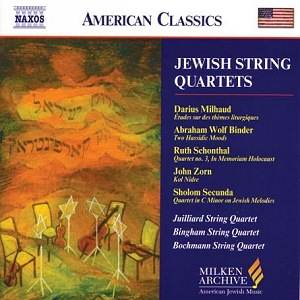|

BUY NOW
AmazonUK
AmazonUS
|
Jewish String Quartets
Darius MILHAUD (1892-1974)
Études sur des thèmes liturgiques du Comtat Venaissin (1973)
(Modéré 4:53; Animé 2:05; Modéré 1:51)
Juilliard String Quartet (Joel Smirnoff, violin; Ronald Copes, violin;
Samuel Rhodes, viola; Joel Krosnick, cello)
Abraham Wolf BINDER (1895-1966)
Two Hassidic Moods (1934)
(I. Meditation 4:41 5. II. Dance 7:09)
Bochmann String Quartet (Michael Bochmann, violin; Mark Messenger, violin;
Helen Roberts, viola; Peter Adams, cello)
Ruth SCHONTHAL (b. 1924)
String Quartet No. 3, In Memoriam Holocaust (1997)
(I. Grave 8:00; II. Lament and Prayer 10:49)
Bingham String Quartet (Stephen Bingham, violin; Sally-Ann Weeks, violin;
Brenda Stewart, viola; James Halsey, cello)
John ZORN
Kol Nidre (1996) 6:20
Ilya Kaler, violin; Perrin Yang, violin; George Taylor, viola; Steven
Doane, cello
Sholom SECUNDA (1894-1974)
String Quartet in C Minor (1945)
(I. Allegretto 9:15; II. Adagio 4:02; III. Allegro
7:47; IV. Allegro con fuoco 10:30)
 Bochmann String
Quartet Bochmann String
Quartet
rec. Oct 2001, AAAL, NYC (Milhaud); Nov 1998 (Binder, Secunda), Feb 1999
(Schonthal), St Silas, London; Sept 1999, Kilbourn Hall, Eastman School,
Rochester, USA (Zorn)
 NAXOS AMERICAN
CLASSICS MILKEN ARCHIVE 8.559451 [77:49] NAXOS AMERICAN
CLASSICS MILKEN ARCHIVE 8.559451 [77:49]
|
Error processing SSI file
|

